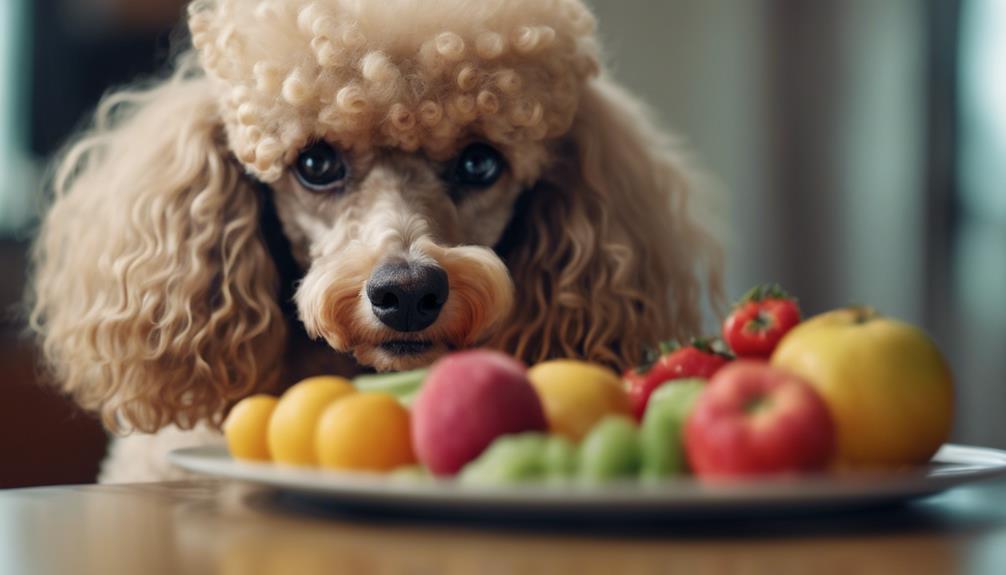When navigating the maze of picky eating habits in your Poodle, it's like untangling a knotted leash on a brisk morning walk—challenging but rewarding. Understanding the root causes of their selective palate is key to fostering healthier eating habits. By implementing a strategic approach to meal planning and presentation, along with consistent routines and a touch of creativity, you can pave the way for your Poodle to embrace a more diverse and nutritious diet. Ready to transform mealtime struggles into mealtime triumphs for your furry companion?
Key Takeaways
- Understand Poodles' small size and delicate appetites for tailored meal plans.
- Address health issues impacting appetite to ensure balanced nutrition.
- Experiment with food textures to find a satisfying and nutritious meal plan.
- Implement meal management strategies for regulating appetite and reducing picky eating behaviors.
Poodle-Specific Picky Eating Challenges
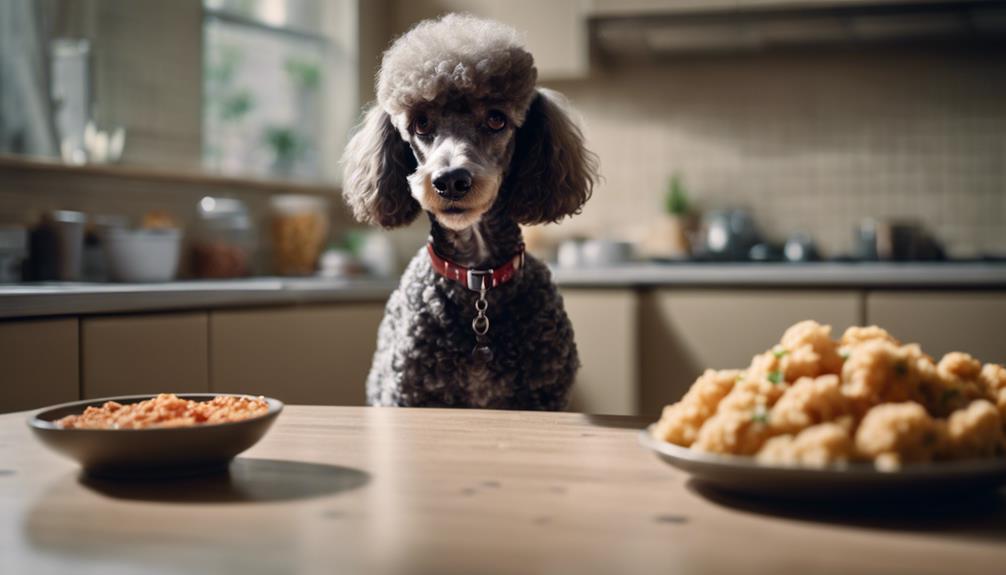
When addressing Poodle-specific picky eating challenges, understanding their small size and delicate appetites is crucial for effective management. Poodles, especially toy Poodles, may have a tendency to overeat due to their petite stature and dainty appetites. It is essential to carefully monitor their food intake to prevent obesity and picky eating habits. In particular, toy Poodles require close attention to their feeding routine to ensure they are not overfed or offered excessive treats and snacks.
To encourage regular meal consumption, selecting the right bowl design and comfort level is vital for Poodles. This can impact their eating habits significantly. Additionally, choosing a high-quality dog food brand like Merrick Backcountry can help address picky eating challenges due to its premium ingredients and consistency. By maintaining a consistent feeding schedule, monitoring their food intake, and providing appropriate meal settings, you can effectively manage Poodle-specific picky eating behaviors and promote healthy eating habits for your furry companion.
Identifying Underlying Health Concerns
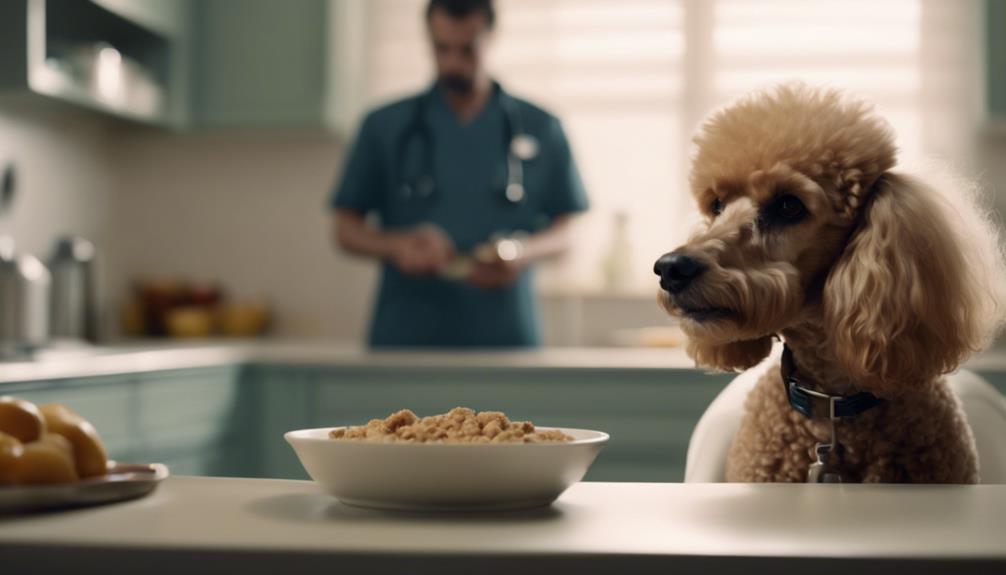
Identifying underlying health concerns in Poodles is essential to understanding and addressing picky eating behaviors effectively. Dental disease, food aversion, and various medical conditions can significantly impact a Poodle's appetite, leading to picky eating habits. Dental pain, such as gum disease or tooth decay, can make eating uncomfortable for Poodles, causing them to avoid certain foods. Food aversion, often linked to allergies or sensitivities, may result in a Poodle being selective about their diet.
Conducting a thorough medical evaluation is crucial in uncovering potential health issues contributing to picky eating. Allergies, gastrointestinal problems, or underlying diseases should be ruled out to determine the root cause of the picky eating behavior. Additionally, considering food safety and the Poodle's overall health status is essential in identifying and addressing any underlying health concerns related to picky eating. By addressing these health issues, you can help your Poodle overcome their picky eating habits and enjoy a balanced and nutritious diet.
Tailoring a Nutritious Meal Plan
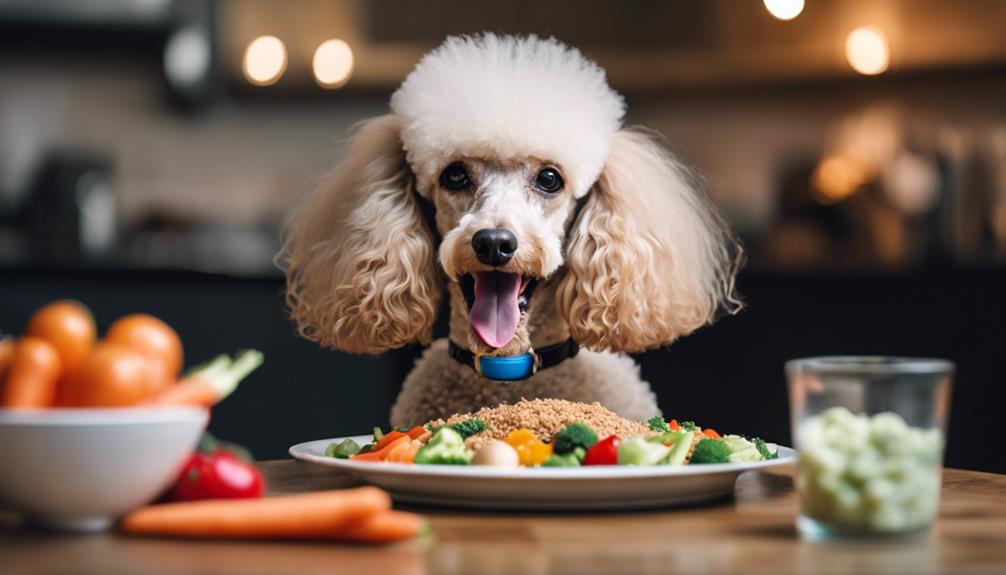
To tailor a nutritious meal plan for your Poodle, consider conducting a meal preferences analysis and experimenting with different food textures. Analyzing your Poodle's preferences and introducing varied textures can help address picky eating behaviors and ensure they receive adequate nutrition. By customizing their meals based on these factors, you can encourage better eating habits and overall health in your beloved pet.
Meal Preferences Analysis
Tailor a nutritious meal plan for your Poodle by analyzing its weight, activity level, and dietary needs to ensure optimal health and well-being. Consider the protein and fat content in food options to meet your Poodle's dietary requirements. Incorporate high-quality ingredients like lean meats, vegetables, and whole grains for a balanced meal. Adjust meal portions based on your Poodle's age, size, and energy expenditure. Consult with a veterinarian or canine nutritionist for personalized advice on creating a meal plan that suits your Poodle's preferences and nutritional needs.
| Factors to Analyze | Recommended Actions | Benefits |
|---|---|---|
| Weight | Adjust portion sizes accordingly | Maintain ideal body condition |
| Activity Level | Choose appropriate calorie intake | Sustain energy levels |
| Dietary Needs | Include necessary nutrients | Support overall health and vitality |
Food Texture Experimentation
To determine an optimal meal texture for your picky-eating Poodle, experiment with a variety of textures like dry kibble, wet food, and raw options. Tailoring a nutritious meal plan involves combining textures to create a balanced diet for your picky dog. Introduce different textures gradually to prevent digestive issues and help your Poodle adjust to new foods. Mix textures by adding moist food to dry kibble or incorporating raw food for added interest and nutrition. Monitor your dog's response to these changes and adjust their meal plan accordingly to encourage better eating habits. By engaging in food texture experimentation, you can find the ideal meal plan that satisfies your Poodle's preferences and nutritional needs.
Addressing Behavioral Factors
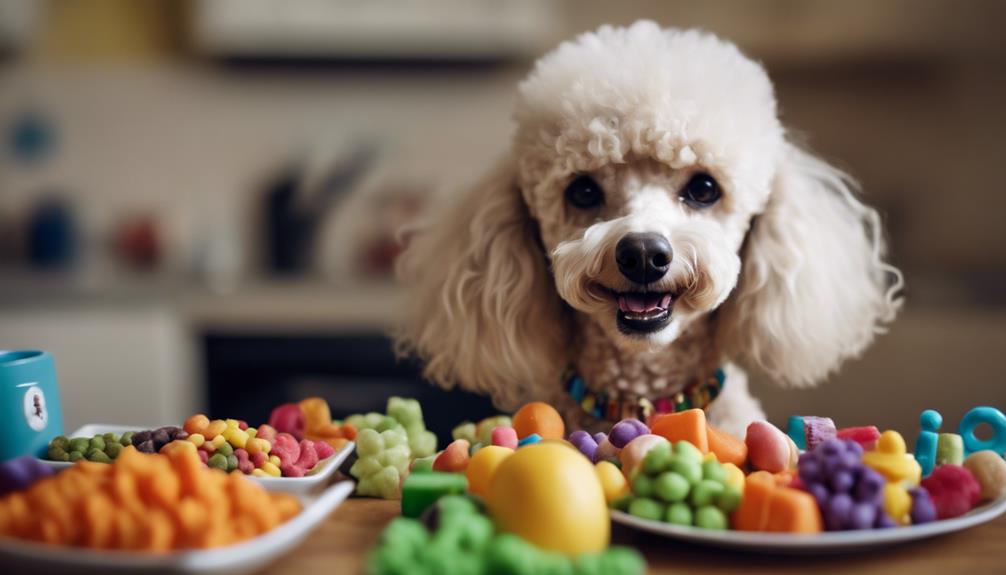
When addressing behavioral factors influencing picky eating in Poodles, focus on creating a calm and positive feeding environment. Behavioral factors such as learned habits or stressors can significantly impact a Poodle's eating behavior. By establishing a tranquil atmosphere during mealtimes, you can help reduce picky eating tendencies. Consistency in feeding schedules and routines is key to addressing these behavioral factors. Additionally, incorporating enrichment activities like food puzzles or interactive feeding toys can stimulate your Poodle's interest in food, making mealtime more engaging and enjoyable. Below is a table summarizing key strategies to address behavioral factors influencing picky eating in Poodles:
| Strategy | Description | Benefits |
|---|---|---|
| Create a calm feeding environment | Minimize distractions and ensure a peaceful setting during meals. | Reduces stress and anxiety during feeding. |
| Consistent feeding schedules and routines | Establish regular meal times to provide structure and predictability for your Poodle. | Helps regulate appetite and eating habits. |
| Use enrichment activities like food puzzles | Engage your Poodle's mind and encourage interaction with food through stimulating activities. | Increases interest in food and reduces picky eating tendencies. |
Creative Food Presentation Techniques
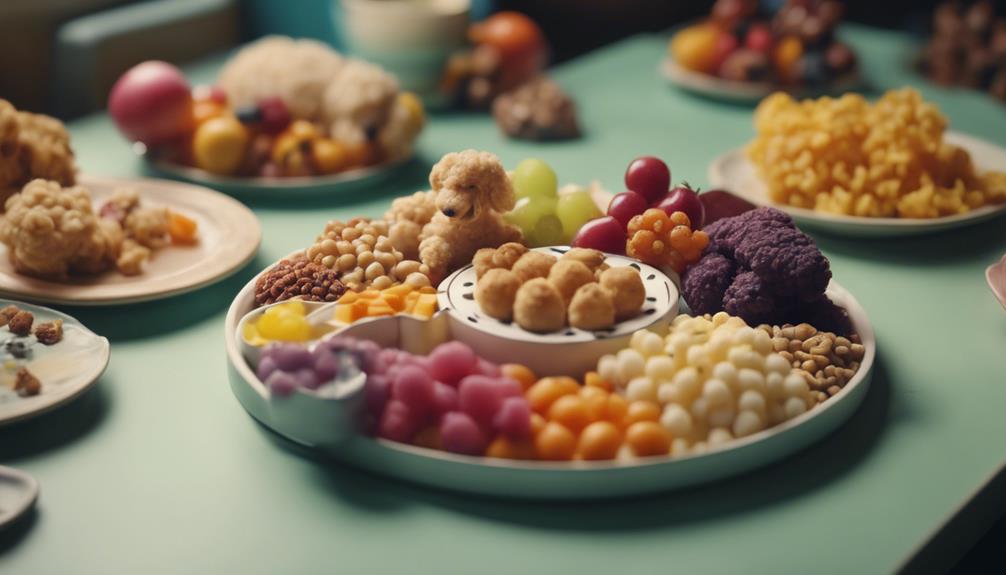
Utilize food puzzle toys and slow feeder bowls to enhance mealtime engagement and prevent fast eating behaviors in Poodles. Food puzzles provide mental stimulation and encourage natural foraging behaviors, making mealtime interactive and enjoyable for your Poodle. Slow feeder bowls are designed with ridges and crevices that slow down eating pace, reducing the risk of bloating and aiding digestion. By incorporating these tools into mealtime, you can train your Poodle to eat at a healthier pace while keeping them mentally engaged.
Interactive feeders, such as food dispensing toys, add an element of fun and challenge to mealtime, rewarding your Poodle's effort with tasty morsels. Experimenting with different food textures like mixing kibble with wet food or adding broth can entice picky eaters with varied tastes and smells. Rotating feeding locations also adds novelty and excitement to mealtime, keeping your Poodle interested in their food. By implementing these creative food presentation techniques, you can make mealtime a positive and rewarding experience for your discerning Poodle.
Establishing Consistent Feeding Routines
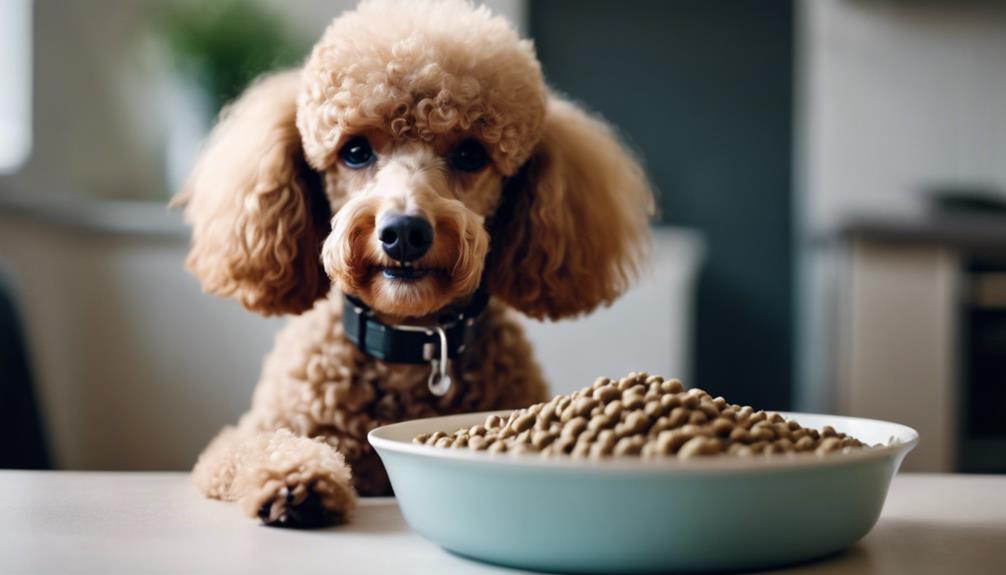
Establishing consistent feeding routines for your Poodle is crucial in maintaining a healthy appetite and preventing picky eating habits. By setting specific meal times and locations, you can create predictability around feeding, encouraging your Poodle to eat during designated times. Consistency in feeding routines helps regulate your Poodle's eating patterns and promotes a balanced diet for optimal health.
Timing of Meals
To enhance your Poodle's eating habits and prevent picky behavior, maintaining a consistent meal schedule is crucial. Scheduled meal times play a vital role in regulating your Poodle's appetite, promoting healthy digestion, and preventing picky eating tendencies. Establishing a routine for meals provides predictability and a sense of security for your Poodle, reducing food anticipation and anxiety. Poodles thrive on consistency, so adhering to a regular feeding schedule can significantly improve their overall eating habits. Consistent meal times also help in maintaining a healthy metabolism for your Poodle. By avoiding random or irregular meal times, you can create a structured environment that supports your Poodle's well-being and encourages healthy eating behaviors.
Meal Location Variety
Introducing meal variety in different locations can effectively prevent picky eating behavior in Poodles while establishing consistent feeding routines. Varying meal spots not only prevents food aversion but also stimulates interest in food, reducing the likelihood of picky eating behaviors. Here's how you can implement this strategy:
- Kitchen: Start here to associate mealtime with a familiar environment.
- Backyard: Offer meals outdoors to add a fresh element to feeding routines.
- Living Room: Create a cozy feeding spot to reduce mealtime stress.
- Balcony: Provide a different view during meals to keep your Poodle engaged.
Consistent feeding routines with varied meal locations can help your Poodle develop a positive relationship with food and avoid picky eating tendencies.
Food Presentation Techniques
Implementing consistent food presentation techniques is crucial in establishing reliable feeding routines for Poodles to promote regular eating habits and reduce picky eating behaviors. Consistency in feeding routines means presenting meals in the same location and at the same time each day. This predictability helps Poodles anticipate meal times, encouraging them to eat when food is offered. Avoid free-feeding and establish specific meal times to create structure and stability. By following a regular feeding schedule, you can help prevent food-related anxiety and promote healthy eating habits in your Poodle. Remember, a stable feeding routine can play a significant role in reducing picky eating behaviors and ensuring your Poodle maintains a balanced diet.
Encouraging Positive Food Associations
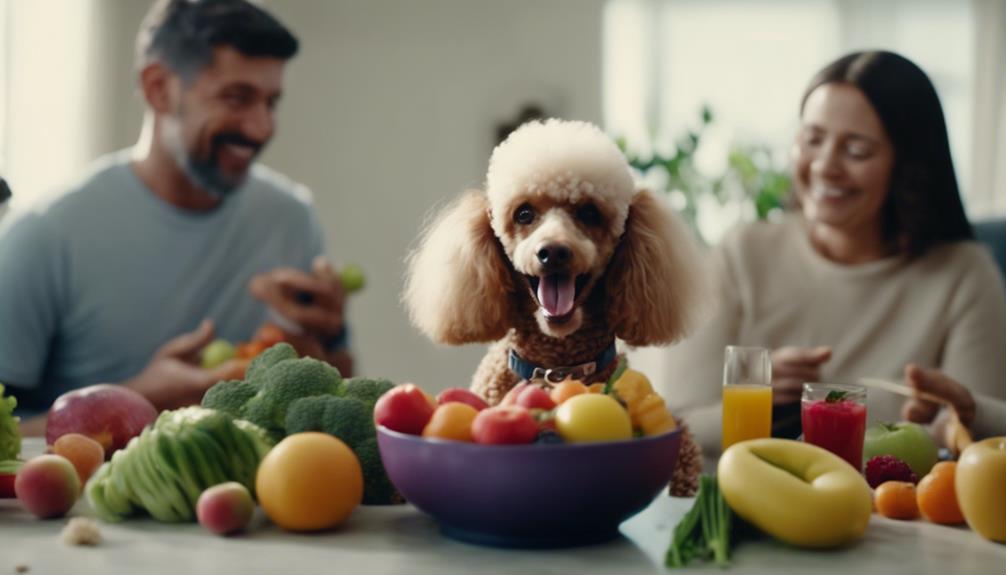
Creating positive food associations in Poodles involves using techniques like positive reinforcement through praise or treats during mealtime. To help your Poodle develop a healthy relationship with food, consider the following strategies:
- Positive Reinforcement: Reward your Poodle with verbal praise or small treats when they eat their meals to associate mealtime with positivity.
- Calm and Quiet Environment: Create a peaceful atmosphere during mealtimes by feeding your Poodle in a quiet area free from distractions, which can reduce stress and anxiety.
- Rotate Different Food Options: Offer a variety of nutritious foods to prevent mealtime monotony and stimulate your Poodle's interest in eating.
- Interactive Feeders: Use food puzzles or interactive feeders to make mealtime engaging and mentally stimulating for your Poodle, promoting a positive food experience.
Seeking Professional Guidance if Needed
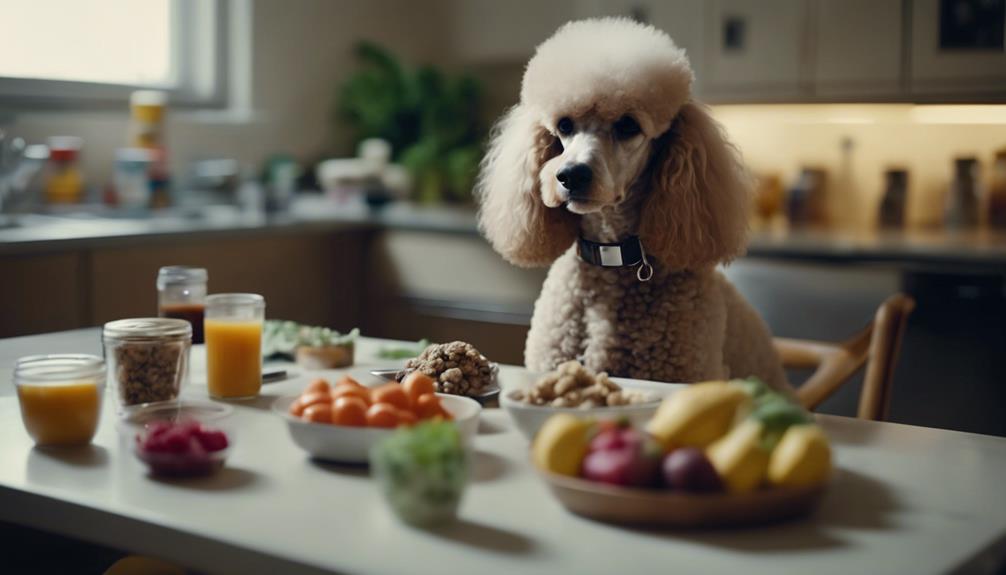
To address persistent picky eating behaviors in your Poodle, consider seeking guidance from a certified dog trainer or animal behaviorist. These professionals have the expertise to analyze your Poodle's specific eating challenges and provide personalized strategies to overcome them effectively. By consulting with a behaviorist or trainer, you can identify underlying causes of picky eating behavior in your Poodle and work on developing tailored solutions. Additionally, involving a veterinarian in the process can help rule out any medical issues that may be contributing to your Poodle's picky eating habits.
Professional help offers the advantage of tailored feeding plans and behavior modification techniques designed to encourage healthier eating habits in Poodles. With their specialized knowledge, these experts can assess your Poodle's individual needs and create a structured approach to address the picky eating behavior. Remember that seeking professional guidance when dealing with persistent picky eating in your Poodle can lead to long-term positive changes and a happier, healthier pet.
Frequently Asked Questions
How Do I Get My Picky Poodle to Eat?
Encourage your poodle to eat by implementing mealtime strategies, treat training, food puzzles, and variety in diet. Consistency in feeding schedules and high-quality food brands will help address picky eating habits while ensuring balanced nutrition.
Are Poodles Typically Picky Eaters?
Poodles vary in food preferences, some being picky eaters. Utilize mealtime strategies like consistency, variety, and monitoring. Address nutritional needs with high-quality options. Train and consult a vet for guidance on picky eating habits.
Why Is My Poodle Not Eating?
When your Poodle isn't eating, it could signal underlying health problems, stress, food preferences, or disruptions in their feeding routine. Behavioral triggers, health issues, dietary preferences, and consistency in feeding can impact your Poodle's appetite.
What Food Do Poodles Like the Most?
Poodles enjoy high-protein treats like chicken or beef. Homemade meals can provide variety for a balanced diet. Training with rewards can help picky eaters. Ensuring nutritional balance is key. Experiment to find what your poodle likes most.
Conclusion
In conclusion, by addressing both health concerns and behavioral factors, you can successfully overcome picky eating in Poodles. Tailoring a nutritious meal plan, establishing consistent feeding routines, and encouraging positive food associations are key strategies. Remember, seeking professional guidance if needed can provide further support in helping your Poodle develop healthier eating habits. By implementing these techniques, you can ensure your Poodle enjoys mealtime and maintains optimal health.
